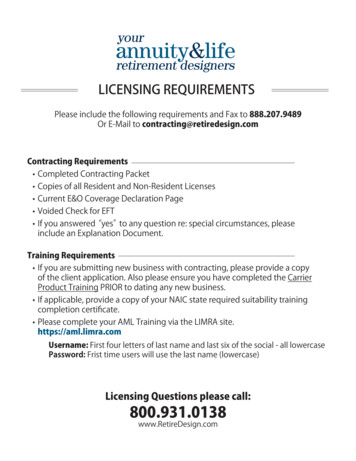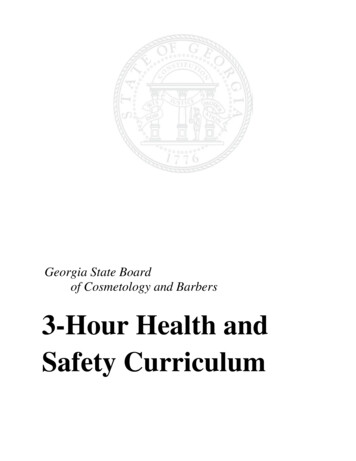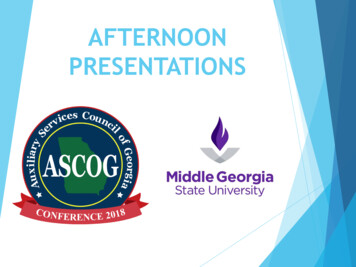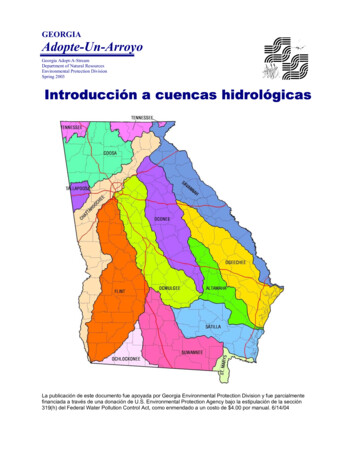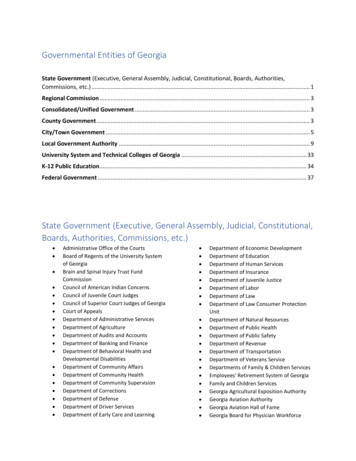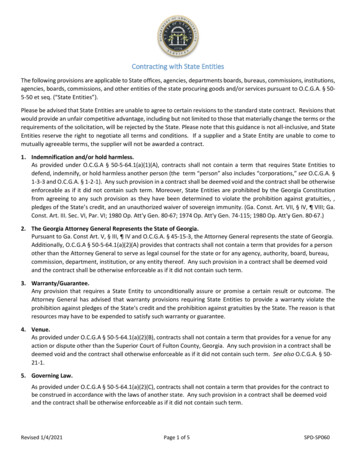
Transcription
Contracting with State EntitiesThe following provisions are applicable to State offices, agencies, departments boards, bureaus, commissions, institutions,agencies, boards, commissions, and other entities of the state procuring goods and/or services pursuant to O.C.G.A. § 505-50 et seq. (“State Entities”).Please be advised that State Entities are unable to agree to certain revisions to the standard state contract. Revisions thatwould provide an unfair competitive advantage, including but not limited to those that materially change the terms or therequirements of the solicitation, will be rejected by the State. Please note that this guidance is not all-inclusive, and StateEntities reserve the right to negotiate all terms and conditions. If a supplier and a State Entity are unable to come tomutually agreeable terms, the supplier will not be awarded a contract.1. Indemnification and/or hold harmless.As provided under O.C.G.A § 50-5-64.1(a)(1)(A), contracts shall not contain a term that requires State Entities todefend, indemnify, or hold harmless another person (the term “person” also includes “corporations,” see O.C.G.A. §1-3-3 and O.C.G.A. § 1-2-1). Any such provision in a contract shall be deemed void and the contract shall be otherwiseenforceable as if it did not contain such term. Moreover, State Entities are prohibited by the Georgia Constitutionfrom agreeing to any such provision as they have been determined to violate the prohibition against gratuities, ,pledges of the State’s credit, and an unauthorized waiver of sovereign immunity. (Ga. Const. Art. VII, § IV, ¶ VIII; Ga.Const. Art. III. Sec. VI, Par. VI; 1980 Op. Att'y Gen. 80-67; 1974 Op. Att'y Gen. 74-115; 1980 Op. Att'y Gen. 80-67.)2. The Georgia Attorney General Represents the State of Georgia.Pursuant to Ga. Const Art. V, § III, ¶ IV and O.C.G.A. § 45-15-3, the Attorney General represents the state of Georgia.Additionally, O.C.G.A § 50-5-64.1(a)(2)(A) provides that contracts shall not contain a term that provides for a personother than the Attorney General to serve as legal counsel for the state or for any agency, authority, board, bureau,commission, department, institution, or any entity thereof. Any such provision in a contract shall be deemed voidand the contract shall be otherwise enforceable as if it did not contain such term.3. Warranty/Guarantee.Any provision that requires a State Entity to unconditionally assure or promise a certain result or outcome. TheAttorney General has advised that warranty provisions requiring State Entities to provide a warranty violate theprohibition against pledges of the State's credit and the prohibition against gratuities by the State. The reason is thatresources may have to be expended to satisfy such warranty or guarantee.4. Venue.As provided under O.C.G.A § 50-5-64.1(a)(2)(B), contracts shall not contain a term that provides for a venue for anyaction or dispute other than the Superior Court of Fulton County, Georgia. Any such provision in a contract shall bedeemed void and the contract shall otherwise enforceable as if it did not contain such term. See also O.C.G.A. § 5021-1.5. Governing Law.As provided under O.C.G.A § 50-5-64.1(a)(2)(C), contracts shall not contain a term that provides for the contract tobe construed in accordance with the laws of another state. Any such provision in a contract shall be deemed voidand the contract shall be otherwise enforceable as if it did not contain such term.Revised 1/4/2021Page 1 of 5SPD-SP060
6. Requirements that the Department pay taxes, interest, penalty fees or cancellation charges, litigation costs, orattorney's fees. ATTORNEY'S FEES/COSTS. State Entities will not agree to pay attorney’s fees or costs. The rationale is that such apayment would pledge the credit of the state in violation of Ga. Const. Art. VII, § IV, ¶ VIII and would be a violationof the gratuities clause of the Georgia Constitution. See Ga. Const. Art. III, § VI, ¶ VI. DAMAGES. The inclusion of indirect, consequential, or incidental damages payable by a State Entity are generallynot acceptable. INTEREST. Except as otherwise explicitly permitted by law, the Department and State Entities will not agree to payinterest. The Attorney General has advised the Department that payment of interest would pledge the credit ofthe state, be prohibited by the gratuities clause of the constitution, and that the Department lacks statutoryauthority to agree to the payment of interest. LATE PAYMENT/CANCELLATION CHARGES. State Entities do not agree to pay late payment charges. This policystems from an opinion of the Attorney General that late payment charges are in the nature of penalty/gratuitywhich the State is constitutionally prohibited from paying. Agreeing to pay such charges would also pledge thecredit of the state in violation of the constitution. 1974 Op. Att'y Gen. 74-115. TAXES. The State is exempt from most taxes and generally will not agree to contract language which requires thepayment of taxes. State Entities will not agree to reimburse the supplier for the payment of taxes. However, StateEntities will agree to language that states "the State Entity will pay taxes lawfully imposed upon it.”7. Binding arbitration or waiver of jury trial.As provided under O.C.G.A § 50-5-64.1(a)(2)(D), contracts shall not contain a term that provides for bindingarbitration. Any such provision in a contract shall be deemed void and the contract shall be otherwise enforceable asif it did not contain such term. Further, State Entities do not maintain the authority to agree to waiver of a jury trial,as State law provides that the Attorney General has exclusive authority and control over all matters of litigation orpotential litigation involving State agencies. Pre-litigation contractual waivers of jury trial are not enforceable inGeorgia. Bank South, N.A. v. Howard, 264 Ga. 339 (1994).8. Any provision requiring a State Entity to be bound by terms and conditions that are unknown at the time of signingthe agreement.As provided under O.C.G.A § 50-5-64.1(a)(1)(B), contracts shall not contain a term that requires State Entities to bebound by terms and conditions that are unknown at the time of signing such contract or which may be unilaterallychanged. Any such provision in a contract shall be deemed void and the contract shall be otherwise enforceable asif it did not contain such term.State Entities will not agree to contract provisions that incorporate additional obligations by references to terms andconditions located at a specific web address, as those provisions may be unilaterally changed.9. Best efforts provisions that require the expenditure of any funds or efforts necessary to meet the obligations of acontract, even if such efforts exceed the dollar amount of the contract.State Entities will not agree to best efforts provisions that require the expenditure of any funds or efforts necessaryto meet the obligations of a contract which exceed the dollar amount of the contract. Similar to warranties and/orguarantees, such provisions violate the prohibition against pledging the State's credit. (Refer to discussion ofwarranties above for more information).10. Contractual provisions which require a State Entity to accept the risk of loss of items or goods during delivery.As a general rule, State Entities do not accept risk of loss until receipt of the items or goods.Revised 1/4/2021Page 2 of 5SPD-SP060
11. Contractual clauses that require a State Entity to purchase insurance policies.State law provides for the Department of Administrative Services to procure insurance for State entities. State Entitiesare covered by the Tort Claims Act and the State of Georgia Broad Form Insurance that is administered by theDepartment of Administrative Services. O.C.G.A. § 50-21-34(a) provides that tort claims against the state may only bepaid from insurance provided under the Tort Claims Act. DOAS will not name an additional insured under thesepolicies.12. No Automatic renewals for agreements obligating state appropriated funds.As provided under O.C.G.A § 50-5-64.1(a)(2)(E), contracts shall not contain a term that provides for an automaticrenewal such that state funds are or would be obligated in subsequent fiscal years. Any such provision in a contractshall be deemed void and the contract shall be otherwise enforceable as if it did not contain such term. Automaticrenewals also pledge the credit of the state in violation of the constitution. 1974 Op. Att'y Gen. 74-115.13. Multiyear Lease, Lease Purchase, and Purchase Contracts.Pursuant to O.C.G.A. § 50-5-64, Multiyear agreements must meet the following requirements:(1) unless (a) all funds required for the contract are maintained by the State Entity in hand at the time ofcontract execution (meaning that the State Entity has all funds necessary to pay the multiyear obligationsand no additional appropriation or revenue are necessary for the State Entity to meet its contractualpayment obligations) and (b) all such funds are obligated via State Entity accounting up front, typically viaPurchase Order Incumbrance: See 1980 Att’y Gen Op. 80-163(2) Standard form – O.C.G.A. § 50-5-64(a) requires that leases and lease purchase agreements shall only beexecuted on a standard form developed by DOAS.(3) Termination of Contract – Contract terminates absolutely at the close of the fiscal year in which it isexecuted and the fiscal year for any renewals. O.C.G.A. § 50-5-64(a)(1).(4) No Automatic Renewals - Contract terminates at the end of each fiscal year and can only be renewed bypositive action taken by the agency. O.C.G.A. § 50-5-64(a)(2).(5) Funding – Contract terminates immediately when funding is no longer available. Agency makesdetermination as to whether funds are unavailable at its sole discretion. O.C.G.A. § 50-5-64(a)(3).(6) Listing of Obligation – Contract must list total obligation for the fiscal year and any obligations forrenewals. O.C.G.A. § 50-5-64(a)(4).(7) Title - Title to any goods or equipment remain with the supplier until fully paid by the agency. O.C.G.A. §50-5-64(a)(5). However, for lease purchases agreements, O.C.G.A. § 50-5-65(b) allows agencies to accepttitle upon execution of the DOAS standard form. Agencies can also transfer title back to the vendor if theagreement is not fully consummated.(8) Interest – Lease Agreement can provide for the payment of interest. O.C.G.A. § 50-5-64(d).14. No liens, security interest, or UCC Filings.The execution or levy against state funds or property is not permitted as there is no waiver of sovereign immunityfor such actions in the Constitution or by the General Assembly, security interests, or UCC filings. Agencies only havepowers conferred by the legislature. State agencies do not have the authority to grant security interests in publicproperty. Dekalb County v. J&A Pipeline Co., 263 Ga. 645 (1993).Revised 1/4/2021Page 3 of 5SPD-SP060
15. Unconditional contract payments.Agencies generally cannot agree to unconditional payments. Any assignment of the Supplier’s right to receivepayment must be subject to all of the Agency’s defenses. As a practical matter, if a dispute arises, the agency needsto be able to resolve the dispute. This is particularly problematic in financing agreements, as a dispute may arisebetween the vendor providing the equipment and the agency and yet the Agreement requires the agency tocontinue paying the financing company. This may constitute as a gratuity, which is prohibited under the StateConstitution. See Ga. Const. Art. III. § VI, ¶ VI). Additionally, State Entities are prohibited from incurring debt exceptas provided by law. Ga. Const. Art. VII, Sec. IV, Par. I; Ga. Const. Art. VII, Sec. IV, Par. VIII; O.C.G.A. § 50-17-24.16. No upfront payments for goods/services.State Entities are generally not authorized to make payment prior to receipt of goods/services. (Pursuant to the Stateof Georgia Accounting Procedures Manual, payables for normal operating expenditures should be recognized whenthe goods and services have been received. Accounting Manual Reference: Section: Vendor Management;Subsection: Payment Method).17. Drug Free Workplace.Pursuant to O.C.G.A. § 50-24-3 and § 50-24-4, the State Entities must include in contracts with contractors as definedin O.C.G.A. § 50-24-2 specific certifications regarding the provision of a drug free workplace and prohibition againstengaging in certain activities relating to unlawful drug-related activities.18. Confidentiality.As provided under O.C.G.A § 50-5-64.1(a)(3), contracts shall not contain a term that is inconsistent with theprovisions of Article 4 of Chapter 18 of Title 50, relating to open records. Any such provision in a contract shall bedeemed void and the contract shall be otherwise enforceable as if it did not contain such term.Any confidentiality provisions in a contract must be subject to the Georgia Open Records Act, O.C.G.A. § 50-18-70 etseq., as State Entities are public agencies of the State of Georgia and subject to other requirements of law or courtorder. Additionally, the Georgia Department of Administrative Services generally considers pricing information to besubject to public disclosure. See State Rd. & Tollway Auth. v. Elec. Transaction Consultants Corp., 306 Ga. App. 487(2010).19. No Boycott of Israel.Pursuant to O.C.G.A. §50-5-85, the state shall not enter into a contract with a total value of 1,000 or greater with anindividual or company if the contract is related to construction or the provision of services, supplies, or informationtechnology unless the contract includes a written certification that such individual or company is not currentlyengaged in, and agrees for the duration of the contract not to engage in, a boycott of Israel.20. Joint Ownership.In general, the State is constitutionally prohibited from becoming a joint owner or stockholder in or with anyindividual, company, association, or corporation. Therefore, State Entities are generally prohibited from agreeing tojoint ownership of intellectual property. See Ga. Const. Art. VII § IV, ¶ VIII.21. E-Verify.Pursuant to O.C.G.A. § 13-10-91, a public employer shall not enter into a contract for the performance of servicesunless the contractor registers and participates in the federal work authorization program. If a supplier is providingservices under a contract with a total compensation amount of 2,500 or greater, (even if such services will beperformed outside of the State of Georgia), DOAS requires a notarized affidavit from the supplier attesting to thefollowing:Revised 1/4/2021Page 4 of 5SPD-SP060
(A) The affiant has registered with, is authorized to use, and uses the federal work authorization program;(B) The user identification number and date of authorization for the affiant;(C) The affiant will continue to use the federal work authorization program throughout the contract period; and(D) The affiant will contract for the physical performance of services in satisfaction of such contract only withsubcontractors who present an affidavit to the contractor with the same information required by subparagraphs(A), (B), and (C) of this paragraph.Additional information regarding the State’s E-verify requirements can be found ionReformandEnforcementAct.html22. Benefits Based Funded Contracts (aka Cost Savings Contracts).Benefits Based Funding Contracts, also referred to as “Cost Savings Contracts” are contracts where privatecompanies assume financial risk for the success of a project and are then paid by the State Entity from the calculatedsavings or revenue gains generated from the project. While these projects may be appealing because they aredesigned to fund improvement initiatives without placing an additional financial burden on the State Entity, thereare legal constraints in implementing these types of contracts. For example, unless specifically authorized in theConstitution, the State’s credit cannot be pledged. Any liability which is not required to be discharged by moneyalready in the treasury, or by taxes to be levied during the year in which the contract under which the liability ariseswas made, is a debt within the meaning of the constitution. A contract violating the Constitutional prohibition onpledging the State’s credit is void.Additionally, Public officials may not charge fees or collect money except as authorized by law. Except under limitedcircumstances, monies collected by a state agency must be deposited into the general fund of the state treasury.Money may be withdrawn from the treasury only by appropriation made by law. Appropriations may not be“earmarked” for any special purpose and all revenues not contractually obligated lapse at the end of the year.O.C.G.A. § 50-5-77 was implemented to increase flexibility in procuring benefits based funded contracts. In theevent that the provisions of O.C.G.A. § 50-5-77 cannot be met for this type of contract, the Department of Lawshould be consulted for further guidance.Revised 1/4/2021Page 5 of 5SPD-SP060
State law provides for the Department of Administrative Services to procure insurance for State entities. State Entities are covered by the Tort Claims Act and the State of Georgia Broad Form Insurance that is administered by the Department of Administrative Services. O.C.G.A. § 50 -21-34(a) provides that tort claims against the state may only be


